Business & Management
Uganda Urged to Embrace Community-Based Conservation Approaches to Tackle Biodiversity Crisis
Published
5 months agoon
By
Jane Anyango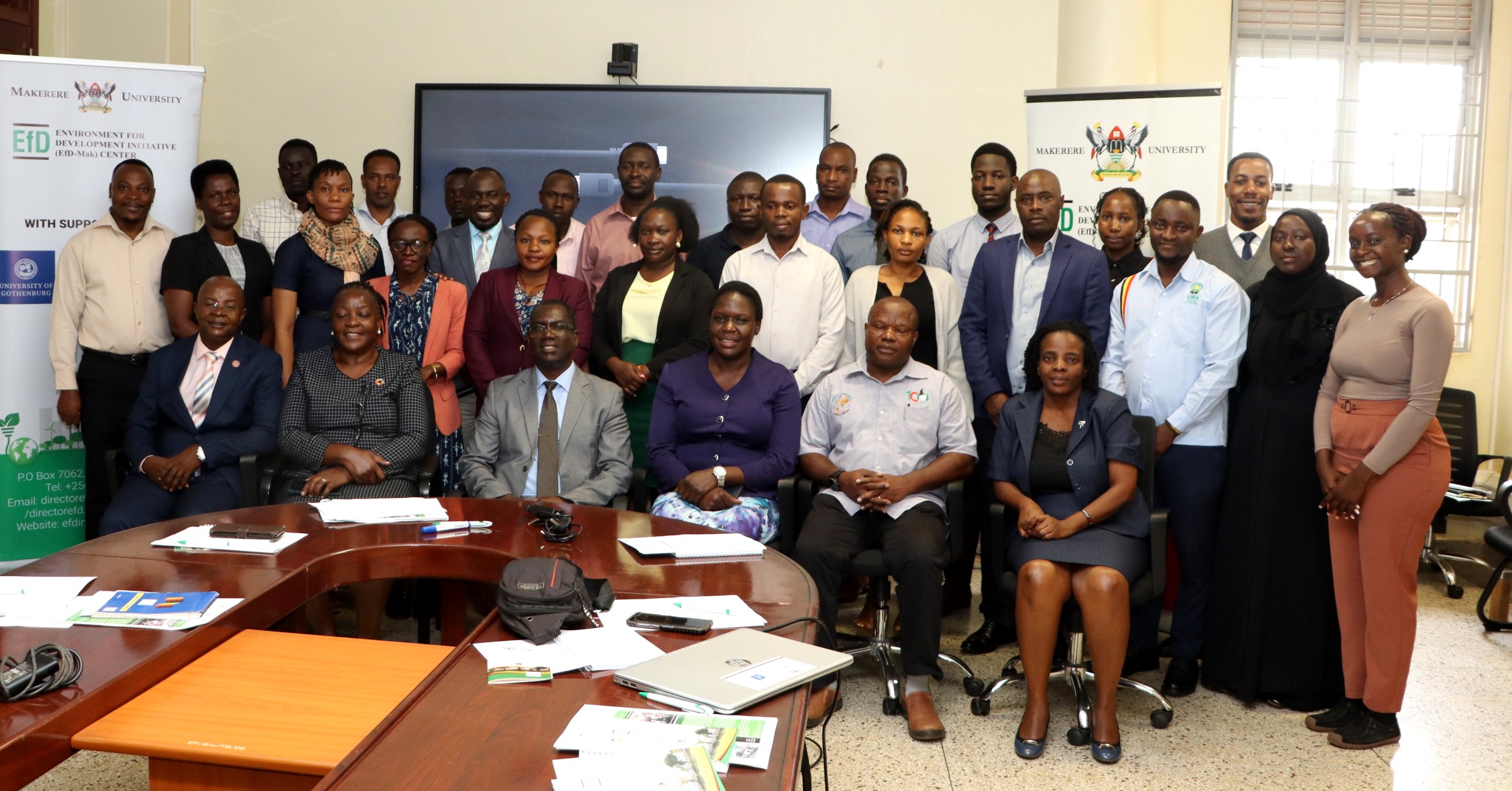
Over 40 Ugandan government officials have been called to integrate communities into biodiversity conservation following a two-day high-level training (August 20–21, 2025) at Makerere University.
Organized by EfD Uganda, the workshop focused on biodiversity conservation, community-based natural resource management, and economic valuation of national parks. Led by renowned environmental economist Prof. Edwin Muchapondwa, the training emphasized aligning conservation efforts with community involvement for lasting impact.
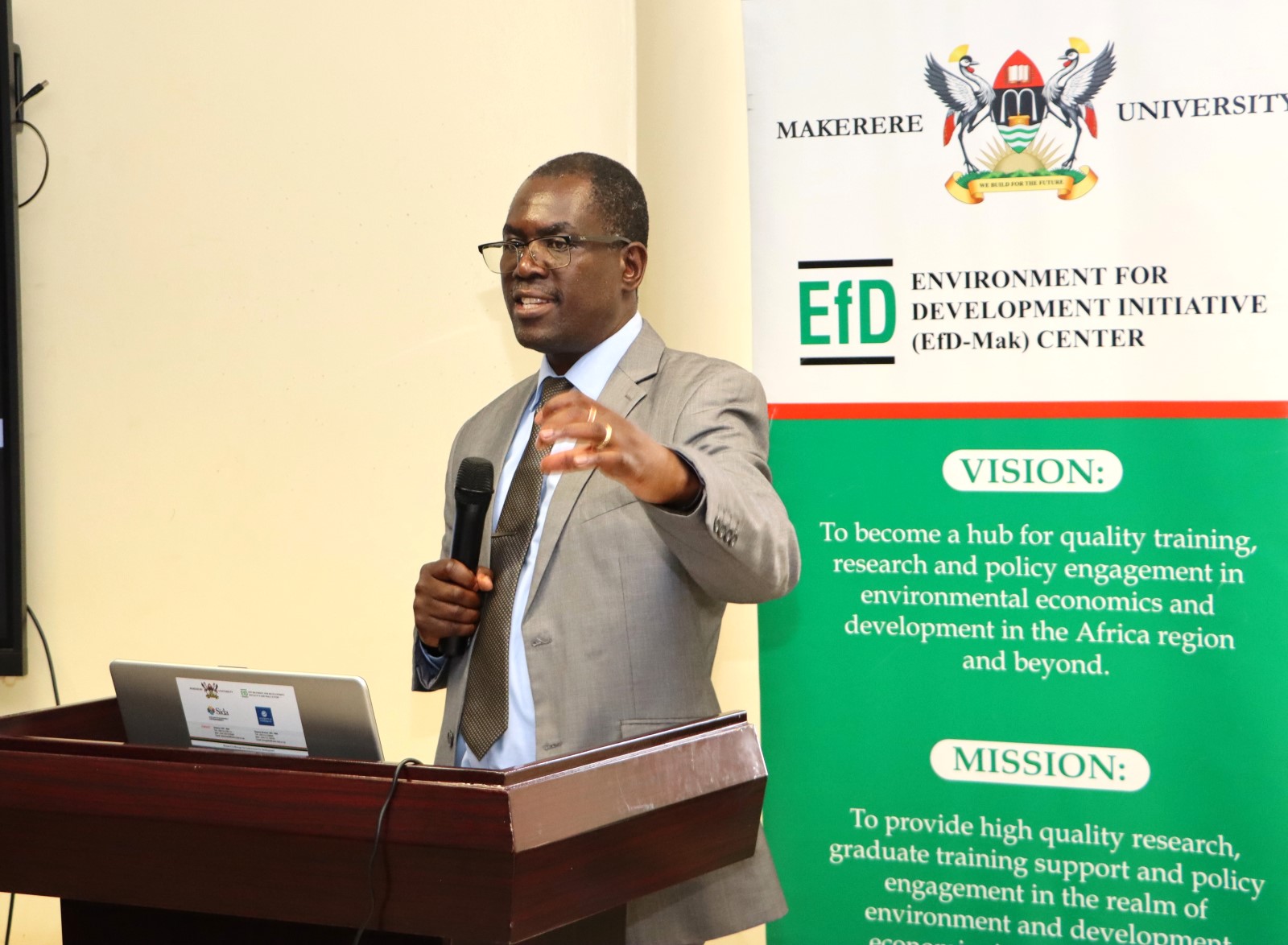
“Communities must be seen not just as beneficiaries but as co-managers of biodiversity,” said Prof. Muchapondwa. “Policy frameworks need to devolve rights to local people to increase their stake in conservation outcomes.”
Participants from ministries and agencies explored Uganda’s biodiversity challenges—including habitat loss, agricultural expansion, poaching, and climate change. Sessions covered conservation principles, legal frameworks, ecosystem valuation, and regulatory tools to integrate biodiversity into national planning.
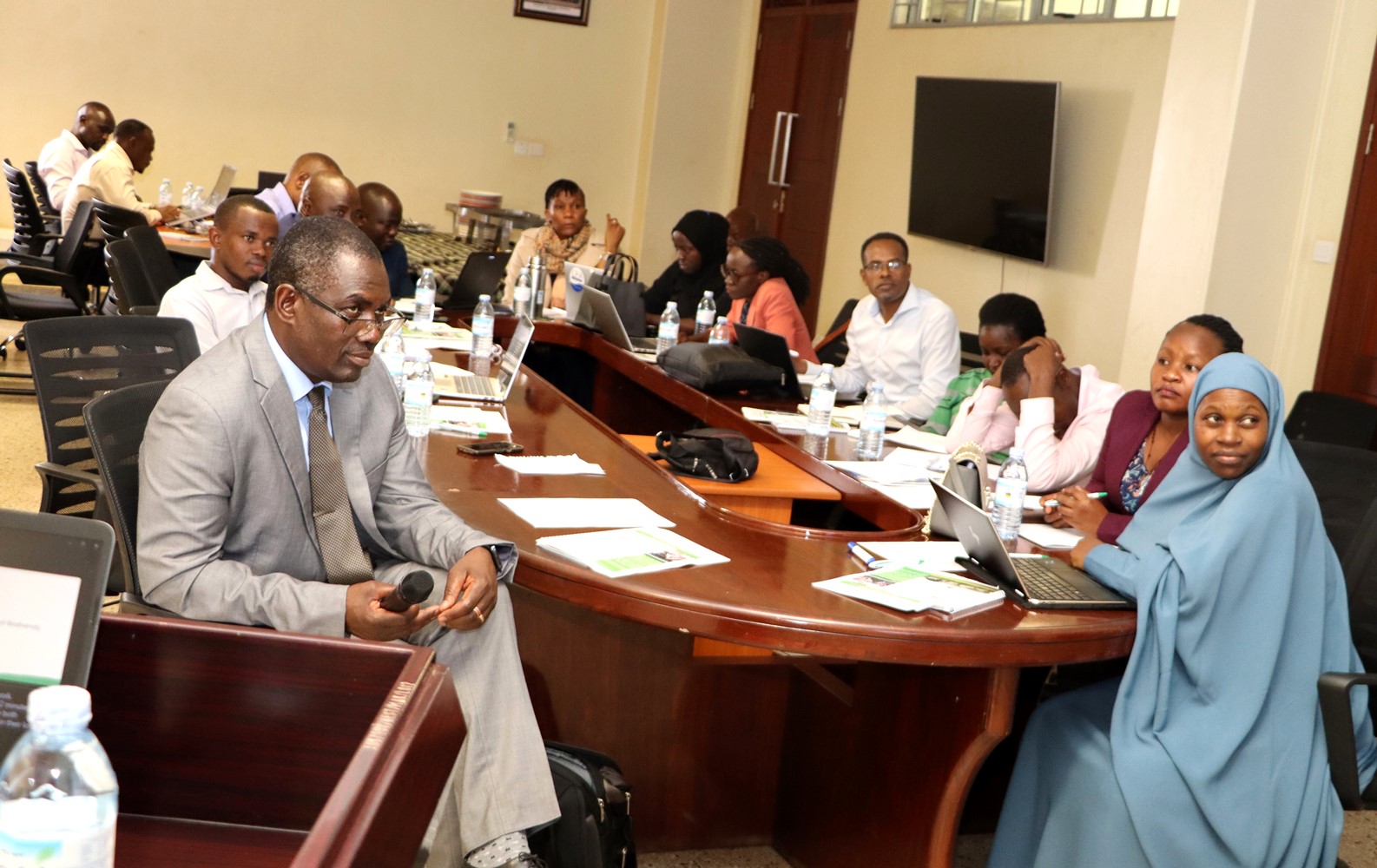
Valuing Nature to Shape Policy
A central theme was the economic valuation of ecosystems—putting monetary value on biodiversity to inform policy and investment decisions.
“When we reduce everything to a common metric, we can make objective, evidence-based decisions—especially when weighing development against conservation,” Prof. Muchapondwa said.
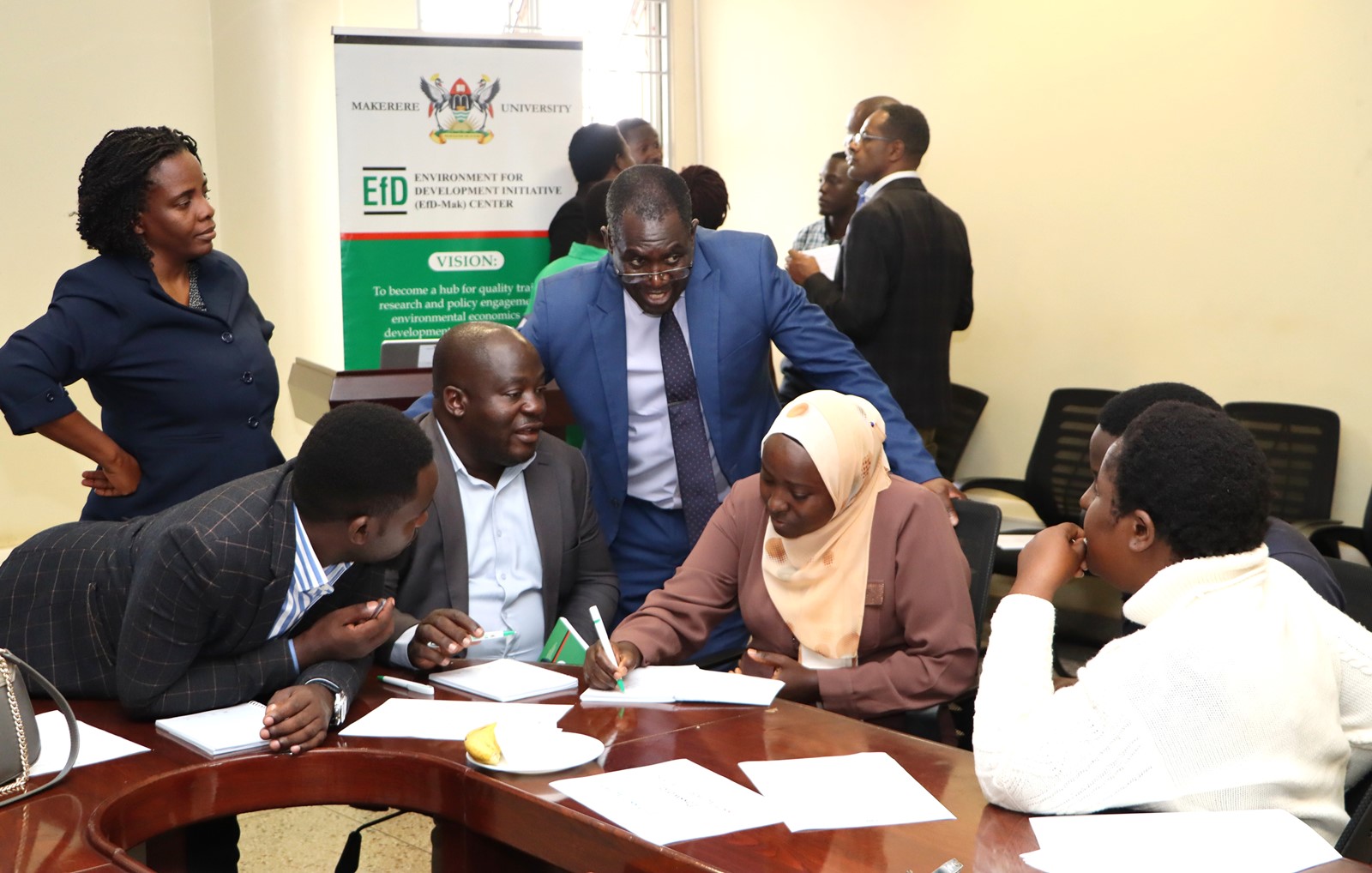
Officials practiced applying valuation methods like contingent valuation and payment for ecosystem services in real-world policy settings, including environmental impact assessments and Uganda’s National Development Plan III.
Despite strong conservation policies on paper, implementation remains weak. “The issue isn’t policy absence but execution,” he noted. “We must adapt successful community-based models from Southern Africa to Uganda’s context.”
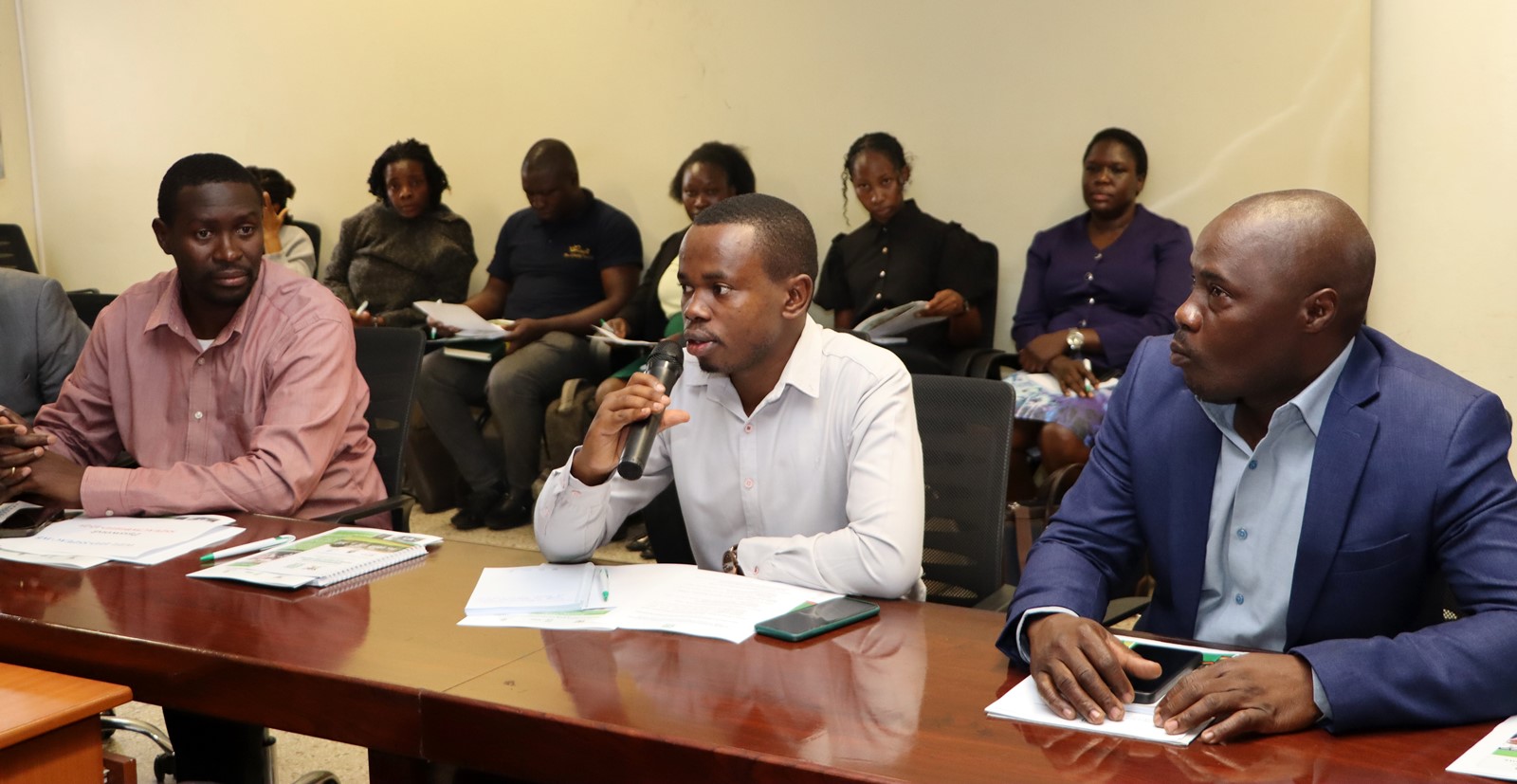
Tourism and Development: A Delicate Balance– Prof. Edward Bbaale
Speaking at the opening, Prof. Edward Bbaale, Director of the EfD–Mak Centre, emphasized collaboration between academia and government to support tourism development and sustainable resource use.
He praised Prof. Muchapondwa as a “pillar of the Environment for Development network” and highlighted the urgent need for research that connects tourism, conservation, and economics.
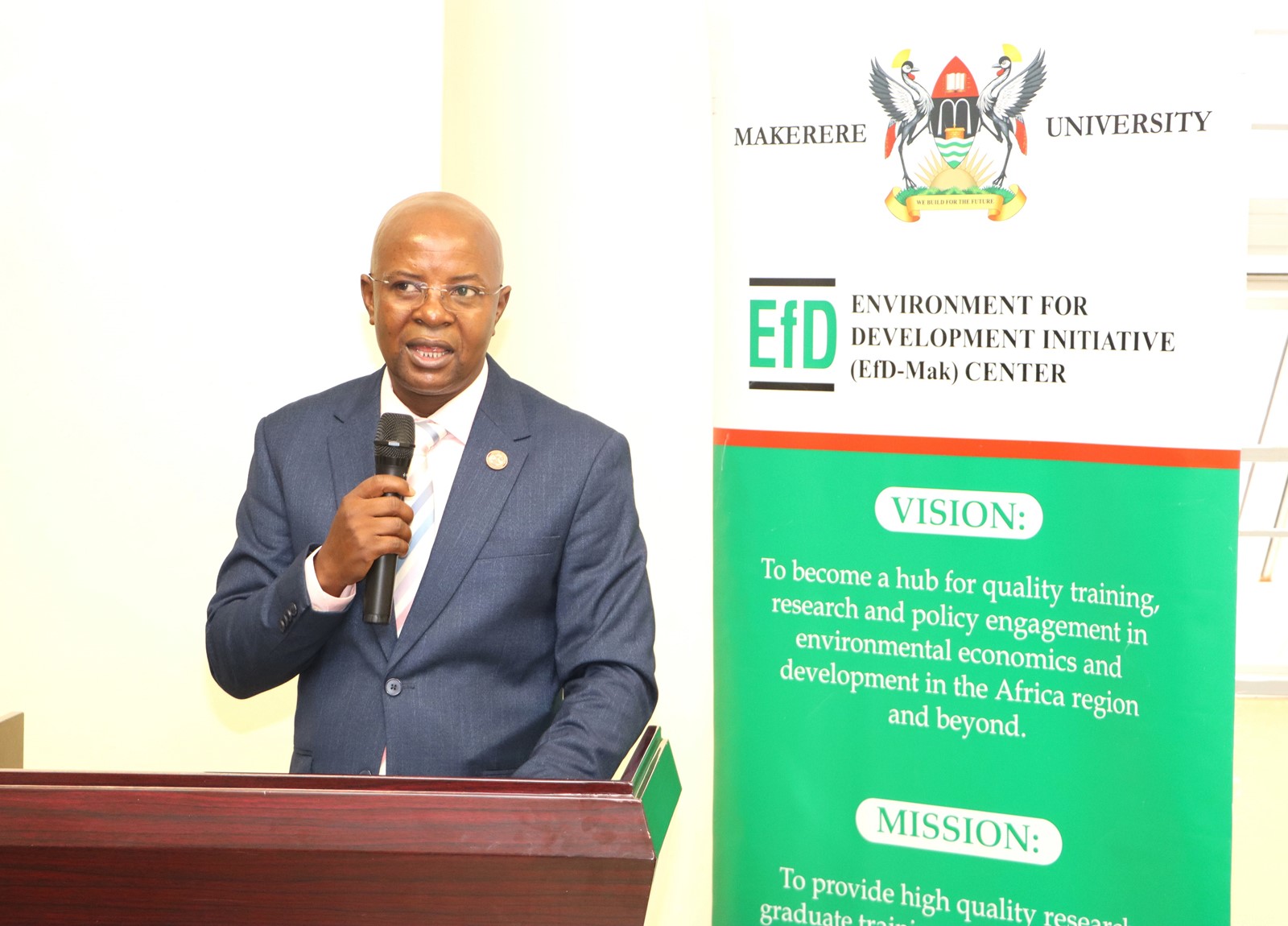
“We’ve had little research from Makerere on tourism and natural resource valuation,” Bbaale said. “Yet this is exactly where government seeks advice.”
Bbaale underscored Uganda’s ambition to grow GDP tenfold—from $50 billion to $500 billion—through sectors like tourism, agro-industrialization, and manufacturing, urging researchers to support this growth with evidence-based insights.
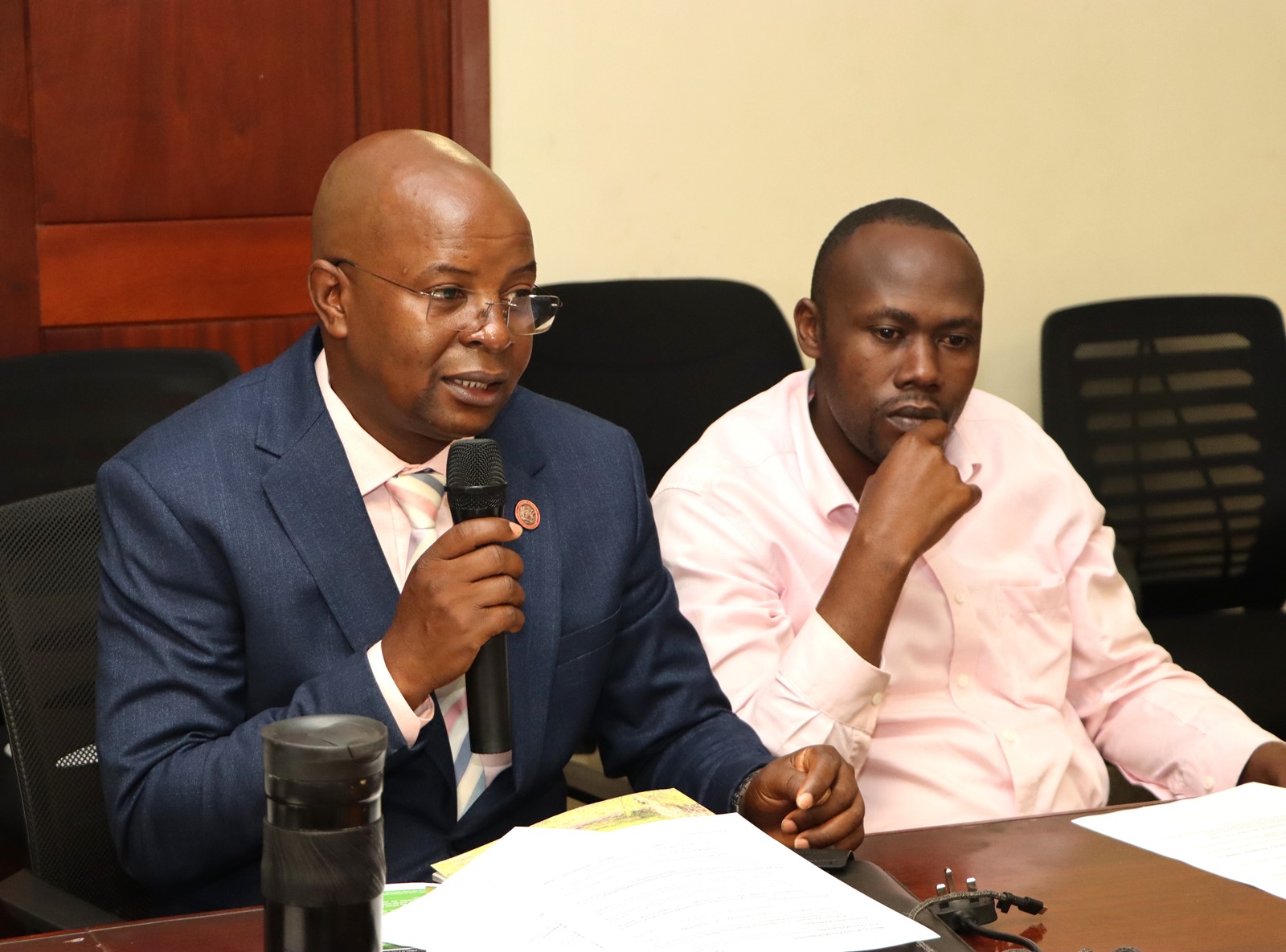
“Makerere houses the highest concentration of PhDs in this country,” he said. “If this research isn’t happening here, where else should it happen?”
The event concluded with a renewed call for stronger partnerships among academia, government, and communities to ensure conservation and development go hand-in-hand.
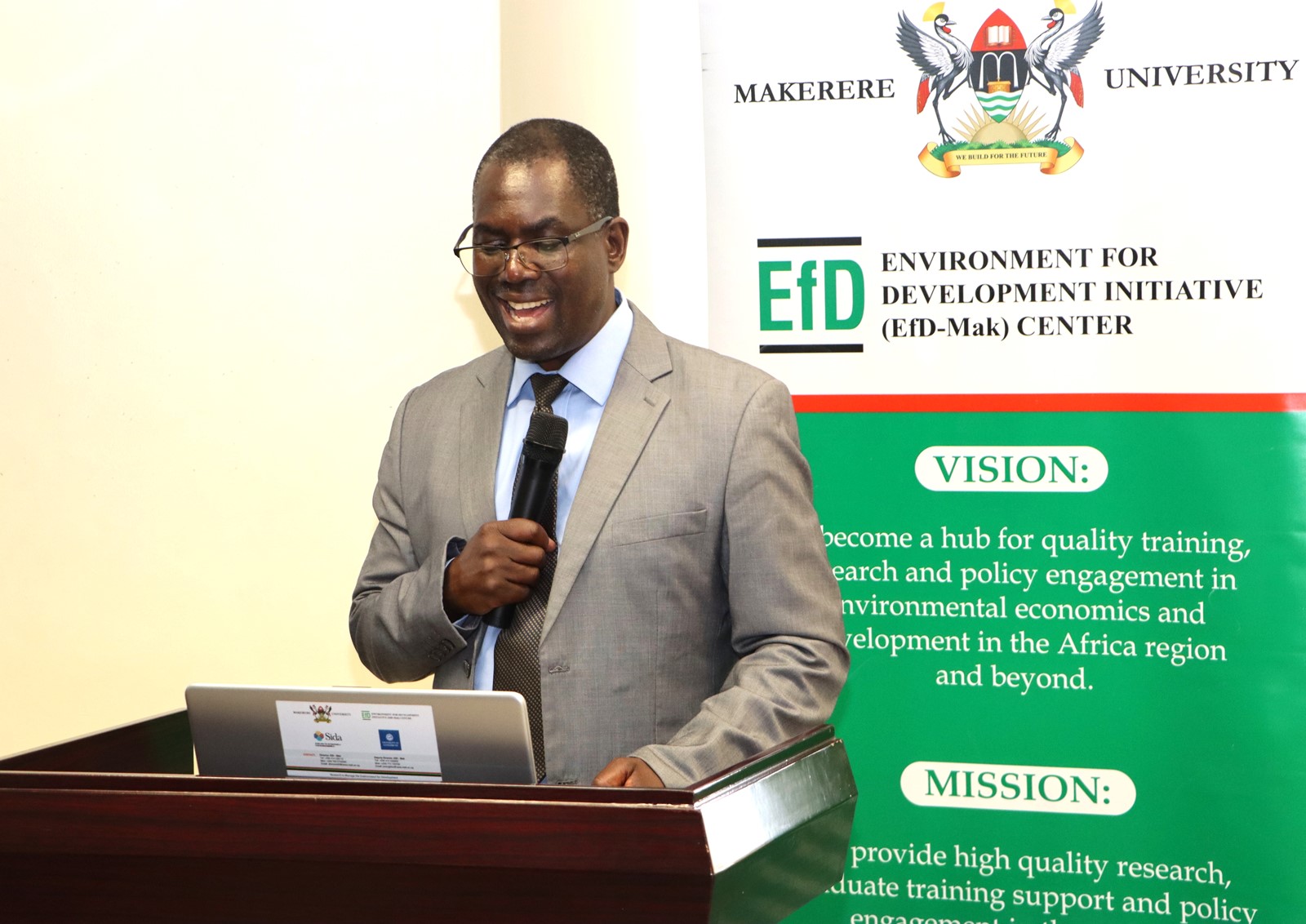
Public Sector Must Rethink Economic Policy Through Biodiversity Lens– Dr. Peter Babyenda
Uganda risks jeopardizing its natural wealth if it continues to undervalue its ecological resources, warned Dr. Peter Babyenda, Research Fellow and Policy Engagement Specialist at EfD–Mak Centre.
“Our forests, wetlands, and ecosystems are routinely excluded from GDP calculations due to limited technical capacity and funding,” he said. “Kenya has made progress—Uganda must catch up.”
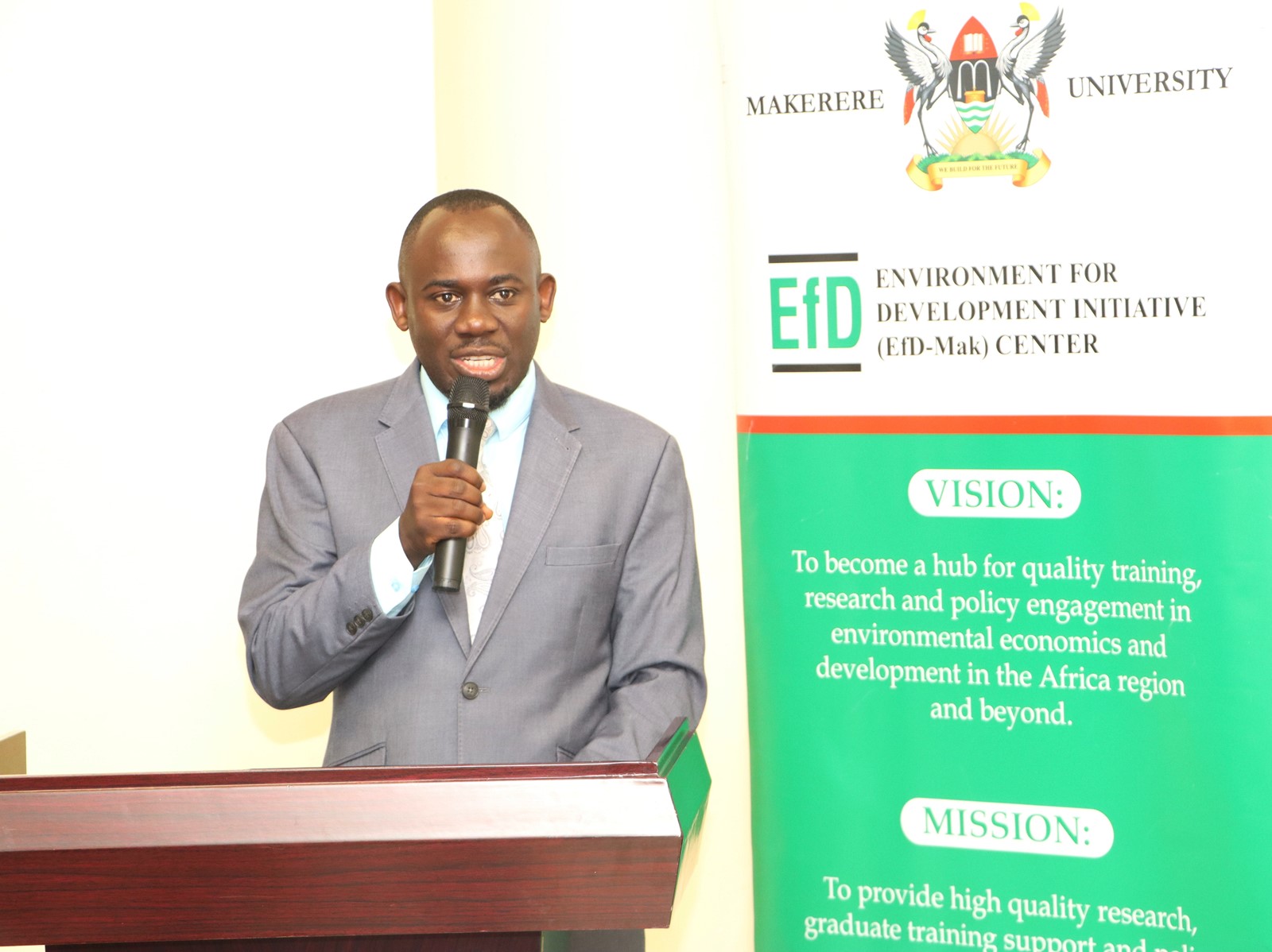
To bridge the gap, EfD–Mak Centre, with support from SIDA, has launched a training program for technical staff from ministries and agencies like the Ministry of Tourism, Uganda Wildlife Authority, and NEMA.
“These are the people who draft policy,” Dr. Babyenda said. “We’re training them to use data and evidence, not emotion, when defending policies.”
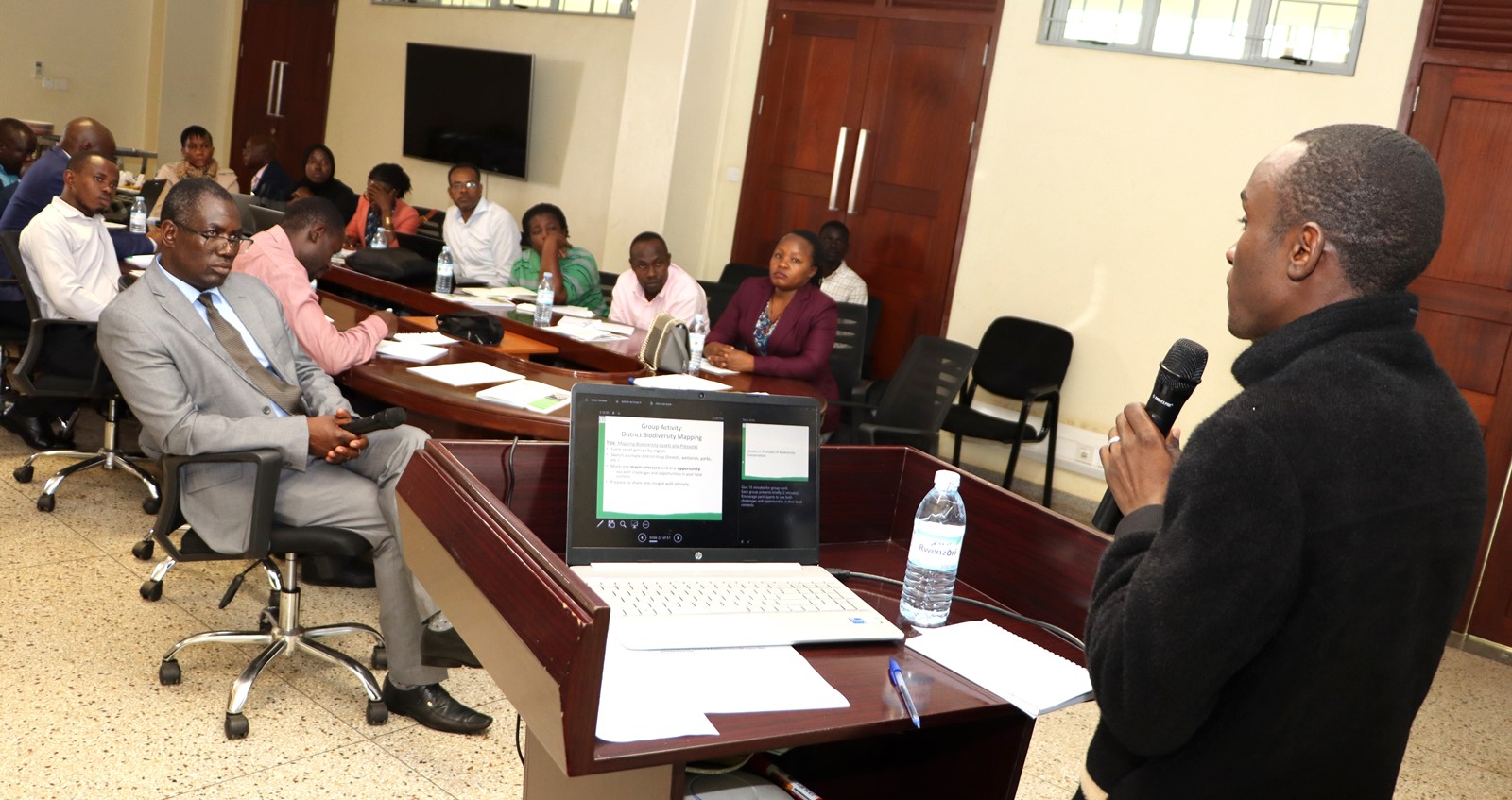
He cited recent transport policy missteps—such as a speed enforcement proposal that failed due to lack of public engagement—as an example of why community participation is essential.
“Especially with human-wildlife conflicts, you must involve locals,” he said. “Solutions like electric fencing must be safe and community-driven.”
Conservation vs. Economic Growth
Uganda’s ambitious goal to grow its economy from $50 billion to $550 billion by 2040 presents risks to biodiversity, particularly from agricultural expansion. Dr. Babyenda stressed the need to balance development with environmental preservation.
“We must promote agriculture without destroying forests and wetlands,” he said. “Our tourism sector, which depends heavily on biodiversity, must also be protected.”
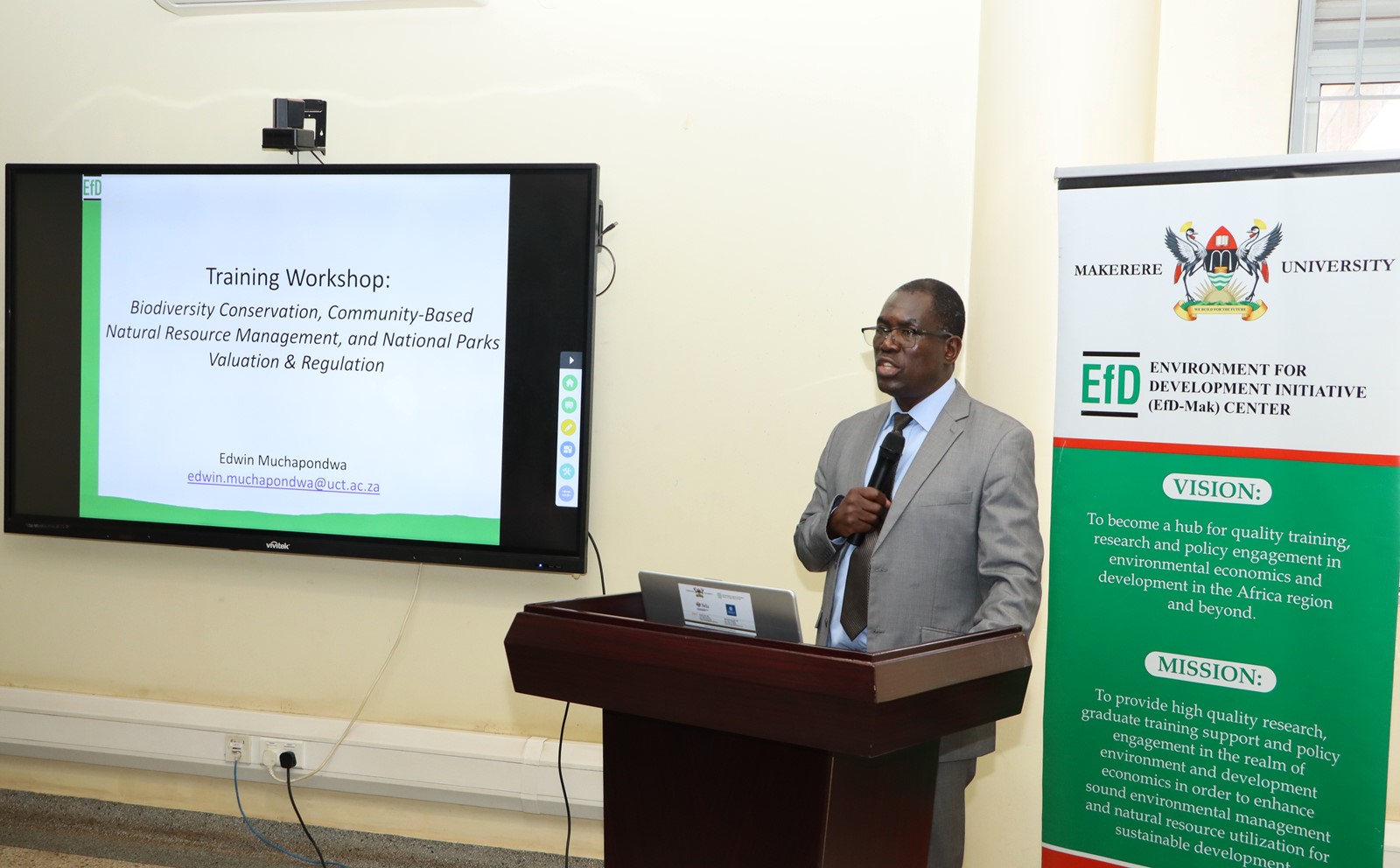
He urged officials to present conservation as an economic asset. “If you show that every additional dollar invested in tourism marketing creates jobs and boosts GDP, people will listen.”
Aligning with Uganda’s National Development Plan IV, Dr. Babyenda called for cross-sector policy coherence.
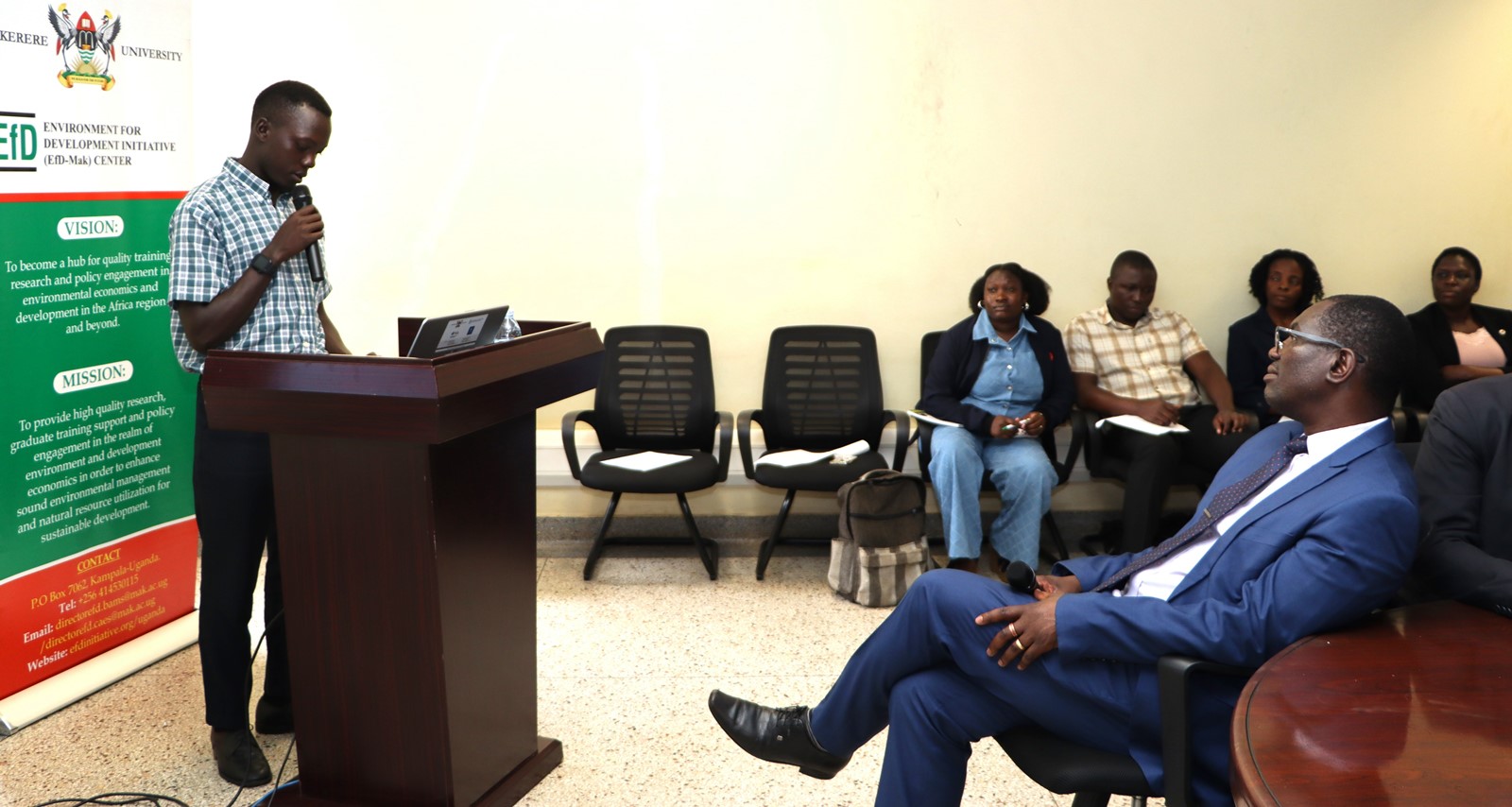
“Tourism, agro-industry, and mineral development must be guided by sound, evidence-based policy,” he concluded. “Otherwise, we risk losing it all.”
Participants Reflections from the Training
Adson Tumwebaze – National Environment Management Authority (NEMA)
As someone working in the Research and Innovations Unit at NEMA, this training was a timely eye-opener. We’ve gained valuable insights into how economic valuation can be integrated into our research and planning frameworks. Understanding the tangible benefits ecosystems provide—and knowing how to quantify those benefits—equips us with the tools to make informed decisions when balancing development and conservation.
For us at NEMA, this goes beyond theory. It supports our mandate of protecting ecosystems and helps us align our work with national policies such as the National Biodiversity Action Plan and BISAP. One of my key takeaways is that you cannot talk about implementing a project on an ecosystem without understanding its value. Once we can economically define these benefits, we can also justify conservation measures, influence policy, and guide budgeting processes more effectively.
Alice Nalweera – Economic Policy Researcher
This training brought clarity to a challenge many of us are grappling with: the growing threats to biodiversity in the face of urbanization, climate change, and population pressure. As we pursue economic development and strive for goals like those outlined in the 2040 export-oriented strategy, we must ask: Can biodiversity and development coexist?
Tourism is one of Uganda’s biggest earners, and it’s entirely dependent on biodiversity—the parks, wildlife, flora, and fauna. Without protecting these resources, our economic aspirations could collapse. What struck me most is the urgent need for accurate data. We can’t conserve what we haven’t identified or valued. Accounting for our natural resources is not optional—it’s essential.
Arthur Ebong – National Planning Authority
From the national planning perspective, this training helped bridge a crucial gap between policy and implementation. While NDP III and NDP IV highlight biodiversity mainstreaming, they often lack depth in practical conservation measures. We used to insert the term “biodiversity” into plans, but lacked the tools to truly value and integrate it.
Learning about valuation methods like hedonic pricing and travel cost analysis opened new avenues for making biodiversity count—literally—in our national plans. And beyond the technical tools, this session also promoted inter-agency collaboration. With stakeholders like NEMA, UWA, and the Ministry of Water in the same room, we can now work more cohesively toward a shared goal.
The training has also inspired curriculum reviews. If we want future planners and policymakers to value biodiversity, we must train them early—through revised academic programs and capacity-building initiatives. This is not just about today’s policies, but the long-term socio-economic transformation of Uganda.
Gertrude Kirabo – Uganda Wildlife Authority (UWA)
At UWA, we face the challenge of balancing conservation with increasing economic pressure around protected areas. This training has been invaluable in helping us understand how to defend conservation efforts using data-driven economic valuation.
Previously, arguments for protecting a forest or wetland often sounded emotional or abstract. Now, we can present facts—cost-benefit analyses that compare the long-term value of ecosystem services with short-term economic gains. This also supports practical decisions like adjusting park permit fees or advocating for higher conservation budgets.
Personally, this training served as a wake-up call. It made me realize how often we’ve given away resources without truly valuing them. I strongly recommend that more field officers and institutional planners go through this kind of training. It’s one thing to learn these concepts in school, and another to see their real-world application. It’s time we started backing conservation with data and strong economic logic.
Jane Anyango is the Communication Officer EfD Uganda.
You may like
-


How People Earn a Living is Contributing to Malaria Risk in Uganda, Study Finds
-


Breaking the Silence on Digital and Gender-Based Violence: Male Changemakers Lead Makerere University’s Strides for Change
-


Advert: Admission to Bachelor of Education External (BED) 2026/27
-


Call for Applications: Diploma Holders under Government Sponsorship 2026/2027
-
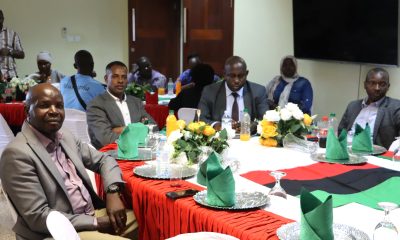

EfD Uganda Marks 2025 Milestones, Sets Strategic Path for 2025–2029
-


Makerere University Launches Knowledge-Sharing Platform to Drive Innovation and Economic Growth
Business & Management
EfD Uganda Marks 2025 Milestones, Sets Strategic Path for 2025–2029
Published
3 weeks agoon
December 20, 2025By
Jane Anyango
Kampala, Uganda – December 19, 2025 — The Environment for Development (EfD) Uganda Centre at Makerere University has taken stock of its 2025 achievements and outlined its strategic direction for 2025–2029, with a strong focus on energy transition, climate change, and sustainable natural resource management.
The reflections were shared during the Centre’s annual end-of-year celebration, which brought together members of the EfD Steering Committee, deans from the School of Economics and the School of Agricultural Sciences, government officials, private sector actors, civil society organisations, researchers, and students.
Interdisciplinary Foundation Strengthens Impact
Addressing stakeholders, EfD Uganda Director, Professor Edward Bbaale, highlighted the Centre’s progress in institutional development, research, policy engagement, and capacity building. While acknowledging challenges encountered during the year, he noted that these provided valuable lessons as the Centre transitions into a new strategic phase under the EfD Strategic Plan (2025–2029).
Prof. Bbaale underscored the Centre’s unique positioning within Makerere University, noting that it is jointly anchored in the School of Economics and the School of Agricultural Sciences. This interdisciplinary foundation, he said, enables EfD Uganda to address complex development challenges such as energy transition, climate change, water resources, forestry, biodiversity, and agriculture from a holistic perspective.
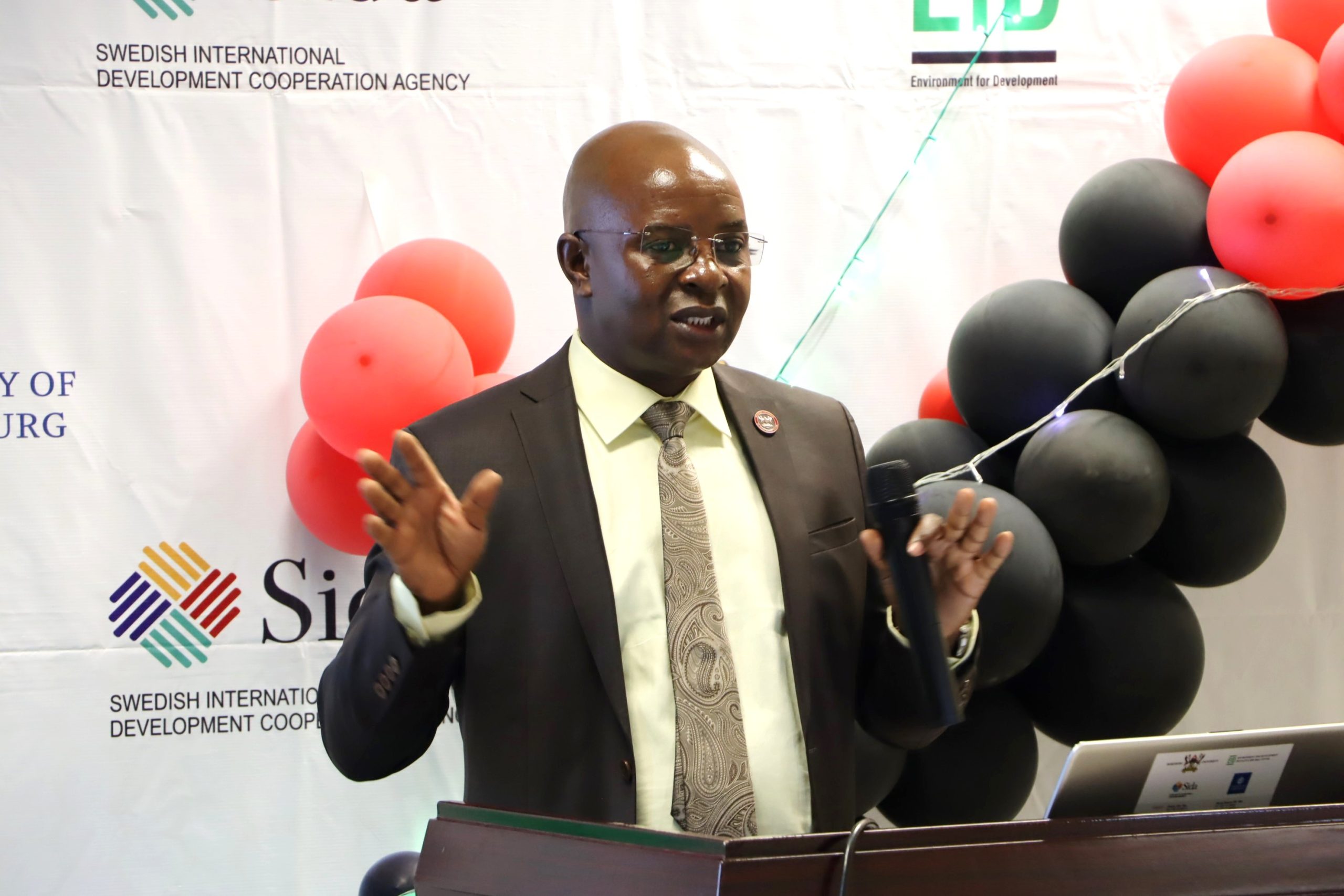
“This approach aligns with Makerere University’s policy on research institutes and reflects global trends that increasingly demand cross-disciplinary collaboration,” he said.
He further highlighted existing academic synergies, with PhD students in Economics and Agricultural Economics sharing coursework, and announced the launch of a Master of Science in Environment and Natural Resource Economics, recently approved by the National Council for Higher Education. The programme, jointly developed by faculty from both schools, is expected to strengthen training in environmental economics and natural resource management.
Strategic Direction for 2025–2029
Prof. Bbaale unveiled the Centre’s strategic plan for 2025–2029, anchored on six thematic areas: energy transition; climate change adaptation and mitigation; climate-smart agriculture; water resources management; forestry and biodiversity; and environmental quality.

He noted that climate change remains a cross-cutting issue across all themes, adding that EfD Uganda will continue to work closely with stakeholders to ensure its research informs national policy and practical interventions.
Over the next five years, the Centre’s research will focus on land use and biodiversity conservation, climate-smart agriculture, climate change adaptation and mitigation, and energy transition-areas expected to generate evidence-based solutions for Uganda and the wider region.

Key stakeholders identified for collaboration include the National Planning Authority, the Ministry of Finance, Planning and Economic Development (Climate Finance Unit), the Ministry of Agriculture, Animal Industry and Fisheries, the Ministry of Water and Environment, the Ministry of Energy and Mineral Development, and district local governments.
Major Achievements in 2025
Prof. Bbaale reported that the Centre concentrated its efforts on the three pillars of Makerere University: research, policy engagement, and training.
Policy Engagement
The Centre organised two high-level dialogues on climate-smart agriculture and a policy dialogue on e-mobility under the Inclusive Green Economy (IGE) programme.
“We chose e-mobility because it is a green mode of transport,” Prof. Bbaale said. “Through the IGE programme, we worked with senior civil servants and policymakers to explore how Uganda can transition to a greener economy.”

The programme also facilitated cross-country peer learning among Ethiopia, Tanzania, Kenya, Rwanda, and Uganda. He cited Rwanda’s rapid electrification of motorcycles through taxation and subsidies, and Tanzania’s success in universal rural electrification, as key lessons.
Capacity Building
The Centre conducted more than ten training sessions for fellows, researchers, policymakers, and graduate students. It also recruited a funded postdoctoral fellow Dr. Gemeda Olani Akuma. from Ethiopia, to work on natural capital issues.
“Postdoctoral fellows are critical to knowledge generation,” Prof. Bbaale noted. “If Makerere strengthens its postdoctoral programme, our research output will more than triple.”
He referenced benchmarking visits to South African universities with strong postdoctoral systems, noting that Makerere is steadily moving toward becoming a research-led institution.
New Projects and Institutional Growth
EfD Uganda launched five new projects and expanded its institutional partnerships during the year. These included Sida-funded initiatives, a consultancy with GIZ, the Centre’s first MakRIF-funded project, and grants from the Gates Foundation and the Carnegie Corporation.
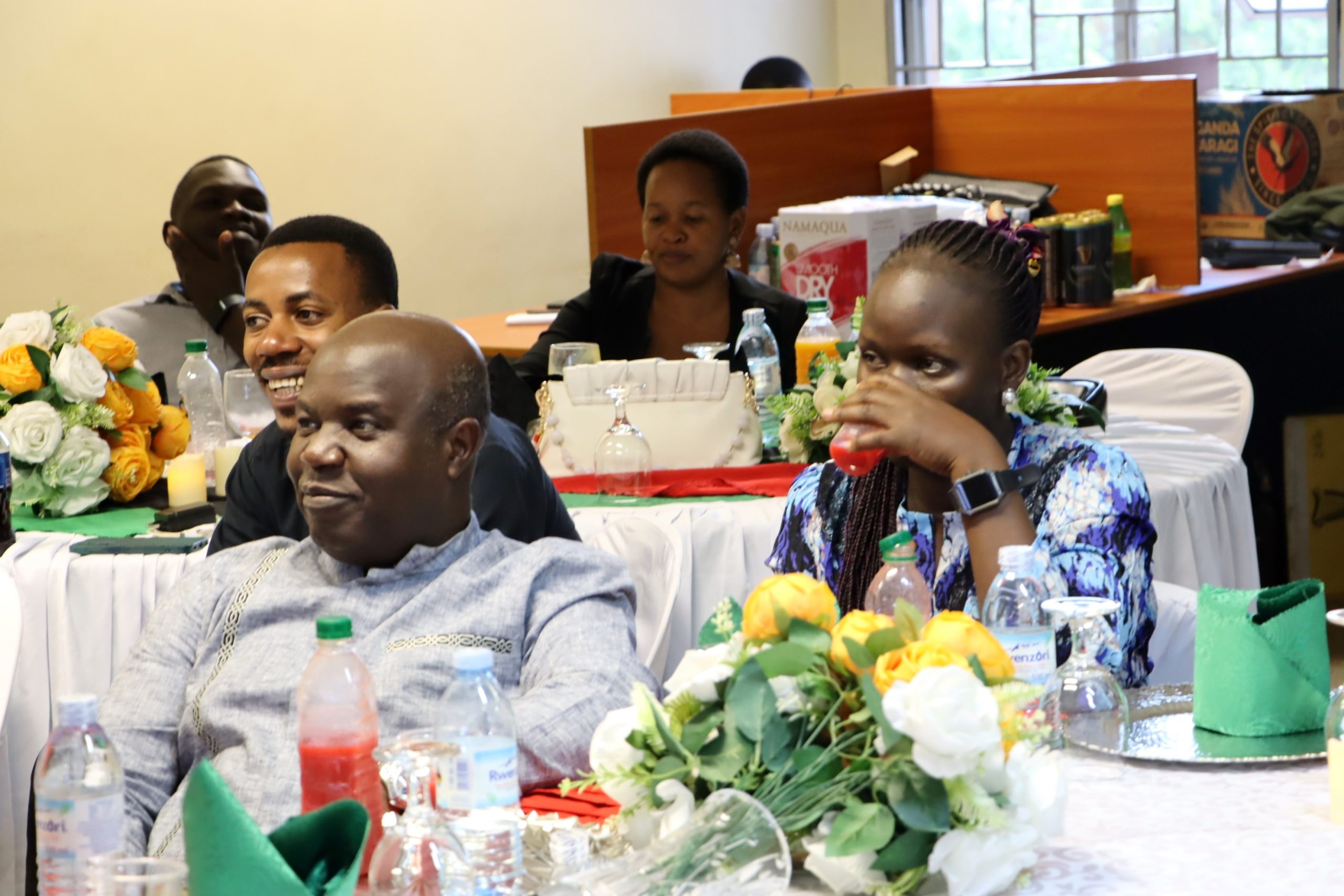
In institutional development, the Centre inaugurated 13 new advisory board members, strengthening governance and oversight. Prof. Bbaale also introduced the Centre’s core staff, praising their dedication and commitment to capacity building, including the mentorship of interns and teaching assistants some of whom have since joined institutions such as the Bank of Uganda.
Strengthening National and International Engagement
The Centre deepened collaboration with national institutions, including the National Planning Authority, the Ministry of Finance, Parliament, and the National Water and Sewerage Corporation. Among ongoing initiatives is a study aimed at improving bill payments at the utility to unlock new investments and service improvements.
EfD Uganda is also working with district local governments to build capacity in environmental valuation and natural capital accounting, supported by MakRIF funding from the Government of Uganda.. Trainings were conducted for districts in central Uganda and in Fort Portal.

At the international level, the Centre hosted visiting scholars, including Prof. Edwin Mchapondwa from the University of Cape Town, who trained government officials on community-based conservation, and Prof. Mark Purdon from the University of Montreal, who launched a book on carbon markets.
EfD’s Natural Capital Accounting Model Adopted by Government
A major highlight was the development of a natural capital accounting model, supported by GIZ and now adopted by the Ministry of Water and Environment. The Excel-based MoneyCap model, developed in collaboration with the Ministry of Finance, UBOS, and the National Planning Authority, supports policy assessment by comparing investment scenarios in natural capital.
“This places us at another level,” Prof. Bbaale said, noting that the model aligns with global climate finance discourse and Africa’s emerging coalition of finance ministers for climate action.

Prof. Bbaale warned that Uganda’s agriculture sector must urgently adapt to climate realities, citing erratic rainfall and rising temperatures. He stressed that climate-smart agriculture is critical to safeguarding livelihoods and food security.
The Centre also celebrated the graduation of a new cohort of Inclusive Green Economy Fellows, supported by Sida, and announced five new grants, including a Carnegie-funded project on household and SME energy efficiency and a grant for climate-sensitive macroeconomic modelling and the Makerere Research and Innovation Fund (MakRIF) from the Government of Uganda
Commitment to Policy-Relevant Research
In his concluding remarks, Prof. Bbaale reaffirmed EfD Uganda’s mission to generate research that delivers practical solutions for policymakers and communities.

“Our work asks a fundamental question: how much natural capital are we depleting in the pursuit of growth?” he said. “That is the frontier we are working on.”
He thanked the Centre’s team for their dedication and contributions throughout the year.
Centre Reaffirms Commitment to Collaboration
Dr. Peter Babyenda, Policy Engagement Specialist, reaffirmed EfD Uganda’s commitment to collaboration with policymakers, academia, civil society, and the media.
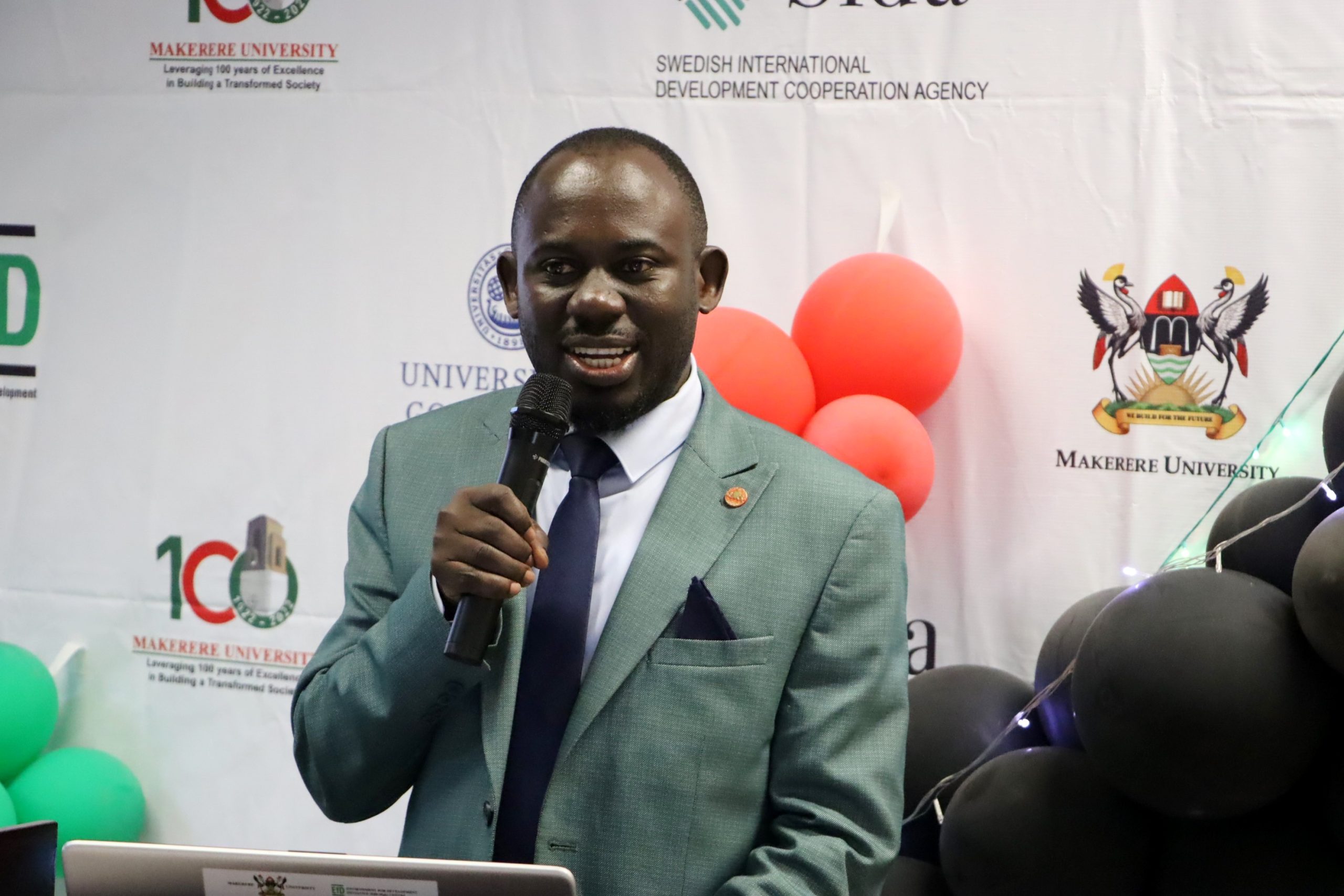
“Policy engagement includes working with the media,” Dr. Babyenda said. “We remain open to partnerships and invite stakeholders to engage with us.”
He thanked participants for attending the annual reflection event and encouraged continued networking.
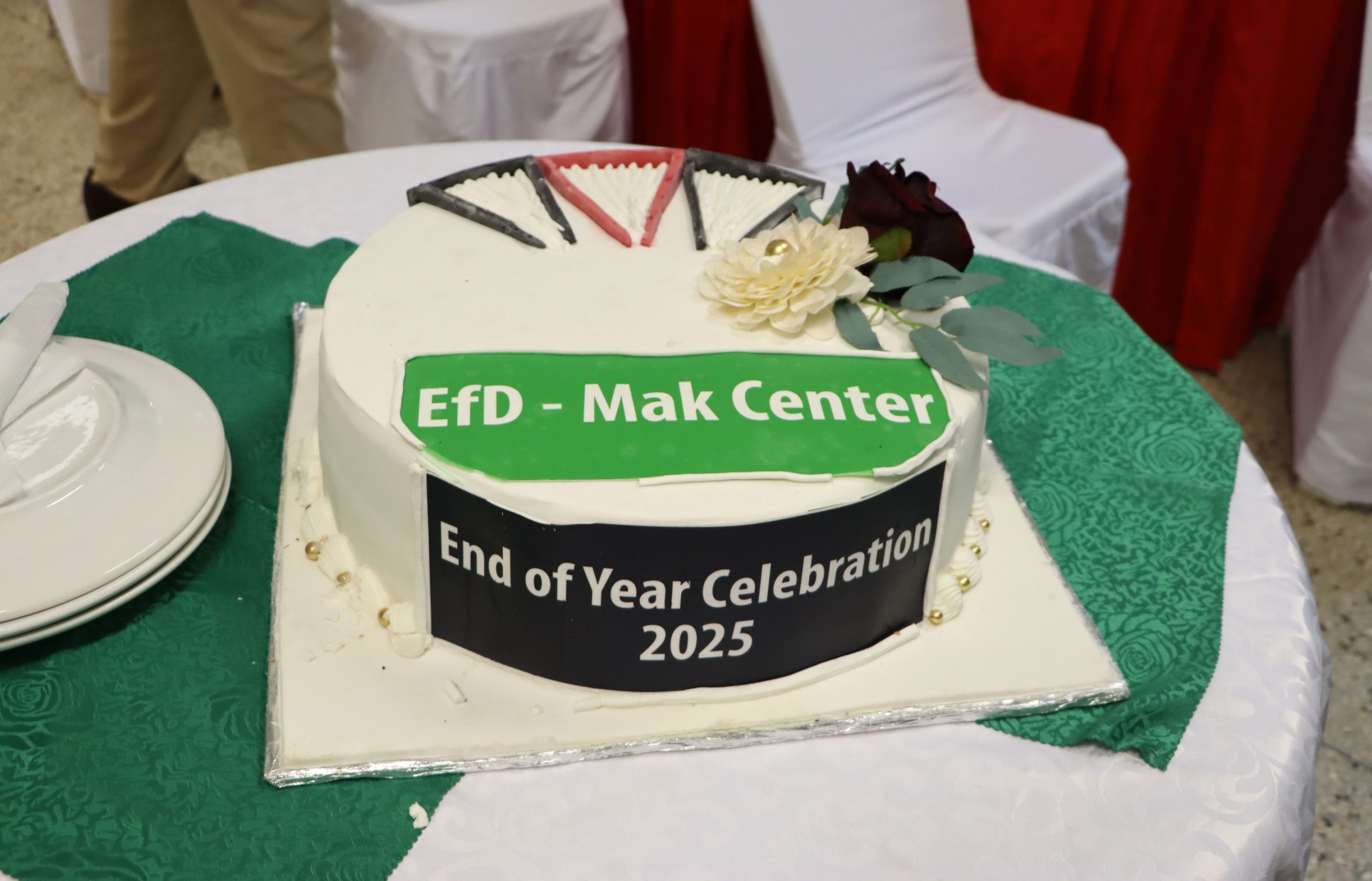
Jane Anyango is the Communication Officer, EfD-Mak Centre
Business & Management
Makerere University CoBAMS Staff celebrate 2025 achievements
Published
3 weeks agoon
December 19, 2025
December 18, 2025 – Coming after the successful completion of the examination season, and as the year comes to an end, the afternoon, evening and night hours of 18th December 2025, presented the best opportunity, to staff to reflect on the 2025 College of Business and Management Sciences (CoBAMS) achievements in a relaxed environment.
The ever-green Makerere University Guest House gardens provided comfort as staff continued to enjoy this lovely space situated on the Makerere University Main Campus.
The event brought together the Principal, Deputy Principal, Deans of the respective Schools, Heads of Department, academic, administrative, technical and support staff, as well as guests, in a mix of celebration, networking, and recognition.

The end of year staff get-together provided a platform to strengthen collegial relationships, and reflect on the College’s future direction. In the true sense of networking, the event also featured dance competitions amongst staff.
Recognition of CoBAMS staff who received the Vice Chancellor’s Excellence Awards 2025

A key highlight of the event featured recognition of the ten (10) members of staff from CoBAMS who received the Vice Chancellor’s Excellence Award 2025. These included: Early Career Scholar Category-Namugenyi Christabellah and Dr. Richard Ssempala, Mid-Career Scholar Category-Dr. Peter Kisaakye, Dr. Anthony Tibaingana, Dr. John A. Mushomi, and Dr. Kasimu Ssendawula, Senior Career Scholar Category-Dr. Stephen O. Wandera, and the Best Teachers Category-Dr. Patricia Ndugga, Dr. Faisal Buyinza and Mr. Fred Kasalirwe.
Presenting the CoBAMS Awards amidst applause from members of staff, the Deputy Vice Chancellor (Academic Affairs)-Prof.Sarah Ssali flanked by the Deputy Principal of the College, Associate Professor James Wokadala read a special message: “Your dedication elevates the standards of the College of Business and Management Sciences and brings distinction to Makerere University.”
Collective Achievements and Strategic Priorities

Professor Edward Bbaale, Principal of CoBAMS, in his end-of-year message, acknowledged the dedication of all staff and their contributions to the college’s success. “I sincerely thank all colleagues across our academic, research, administrative, and support units for your relentless dedication to advancing the mandate of the College. Your collective efforts remain the backbone of our success and institutional resilience,” he said.
Prof. Bbaale highlighted notable achievements in research and publications, congratulating staff who received the Vice Chancellor’s Excellence Awards and Best Teacher Awards. “These achievements reflect individual distinction and collective pride for our College. I encourage you to sustain this excellent performance,” he said. He further recognised faculty who secured research grants from Mak-RIF, international development partners including the Gates Foundation, UN-PAGE, GGGI, the World Bank, and Erasmus+, noting that such successes reflect growing global trust in CoBAMS scholarship.
The Principal underscored the college’s role in fostering institutional growth and partnerships. “I appreciate colleagues who have initiated and advanced Memoranda of Understanding with domestic and international partners. These platforms strengthen relevant academic training, impactful research, and policy engagement,” he said.
He highlighted new academic programs responsive to Uganda’s economic and societal needs, emphasising the college’s forward-looking and development-oriented approach.
Prof. Bbaale praised initiatives promoting staff welfare and cohesion, including the CoBAMS Physical Fitness Programme and the Mak-CoBAMS SACCO.
On infrastructure development, the Principal noted, “Government has allocated resources to commence the CoBAMS Infrastructure Expansion Project, and the University Council has approved two strategically located plots of land for its implementation. We shall actively engage the design consultant to ensure the buildings meet our teaching, research, innovation, and policy-engagement needs.”
He concluded his remarks by acknowledging life’s challenges alongside successes, extending condolences to staff who lost loved ones in 2025 and seasonal greetings: “As we step into 2026, I wish you and your families a year filled with God’s abundant blessings, good health, professional fulfilment, and personal joy. Merry Christmas and a Happy New Year to all.”
DVC Academic Affairs praises Research, Innovation, and Integrity
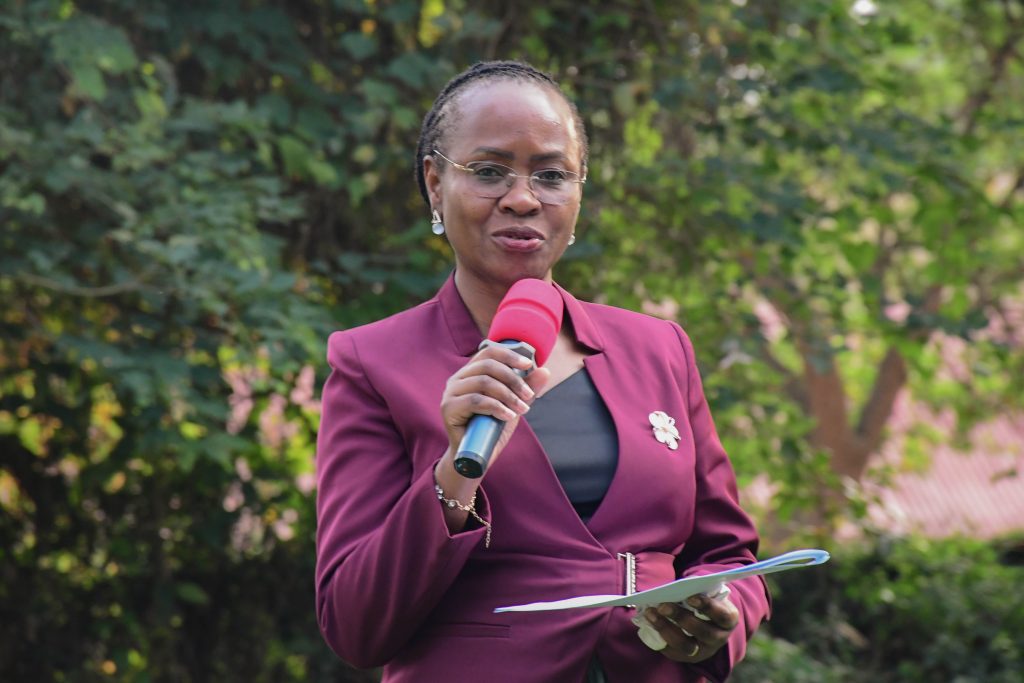
The Deputy Vice Chancellor for Academic Affairs, Professor Sarah Ssali, praised CoBAMS for its contribution to Makerere University’s strategic goals.
She extended warm greetings from the university management, including the Vice Chancellor, and underscored the importance of every staff member’s role. “Whatever role you play, you are adding a brick to this institution, just as those before us did,” she said.
Prof. Ssali highlighted the college’s research-led initiatives, emphasizing the importance of postgraduate and doctoral programs as a pipeline for academic excellence. “I commend CoBAMS for taking this seriously. Your work reflects the university’s strategic direction and internationalisation,” she said.
She noted the recent launch of the CoBAMS Working Paper Series and encouraged its development into four journals in economics, business, statistics, and planning in the near future. “This will allow graduate students to actively contribute, mentoring the next generation of scholars while strengthening Africa’s knowledge production and decolonising knowledge,” she explained.
The DVC Academic Affairs acknowledged CoBAMS for innovative approaches to research and value addition. “During the Entrepreneurship Expo, your work with coffee demonstrated how one thematic area can generate multiple products—from coffee oil to bath scrubs—showing creativity and value addition. Similarly, demography and population studies contribute crucial expertise, from census data to electoral processes,” she said.
Prof. Ssali encouraged the college to document and develop indigenous knowledge systems. “Your role as a college is to study local economic models, explore African-informed business and economic practices, and produce scholarship that reflects local realities,” she said.
She congratulated faculty members who secured research grants, published in peer-reviewed journals, or served as editors, noting that these achievements reflect both individual excellence and the academic culture of CoBAMS.
Reflecting on the Professor Emmanuel Tumusiime-Mutebile Centre of Excellence at Makerere University and the research promoted by the Tumusiime Mutebile Foundation, Prof. Ssali called for rigorous development of the initiative. “While research chairs focus on individual scholarship, Centres of Excellence build pipelines of knowledge for future generations, preserving the legacy of scholars namely Dr Mutebile in monetary policy, finance, and banking,” she said.
Networking and Teamwork
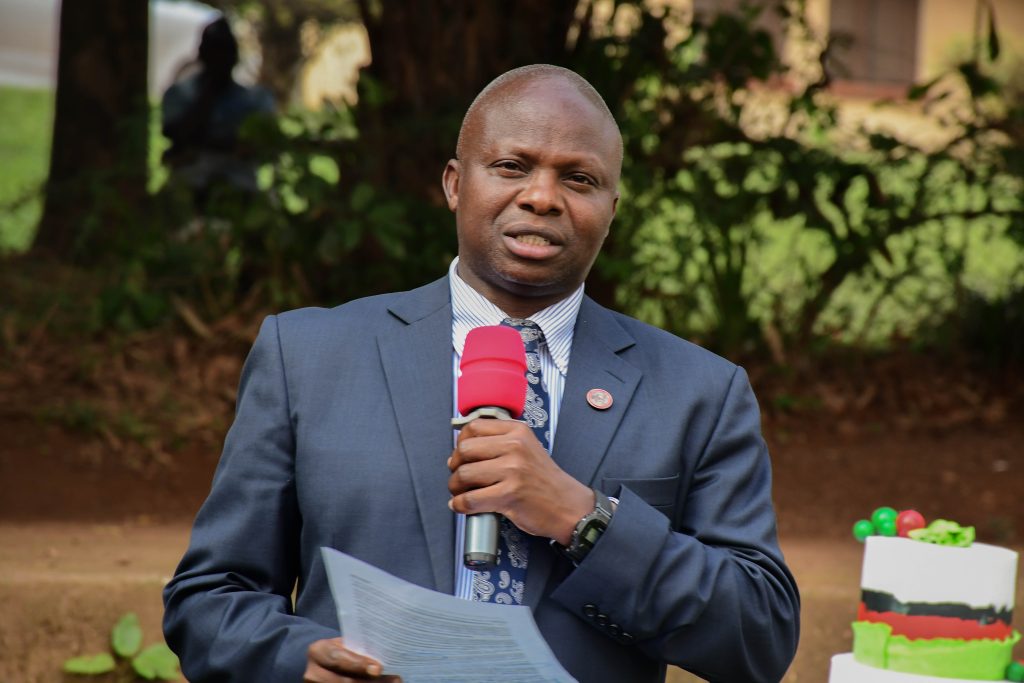
In his address, Associate Professor James Wokadala, the Deputy Principal of CoBAMS, emphasized the importance of networking and teamwork. “Today is a day for networking. This is a time to connect socially, celebrate, and reaffirm our commitment to serve Makerere University and, specifically, our College.”
He applauded staff for supporting the college’s teaching, learning, research, and student mentorship activities. He highlighted CoBAMS’ innovative initiatives, including the CoBAMS SACCO and the CoBAMS fitness club, which promote teamwork, wellness, and collegiality.
He thanked the event organisers for their efforts and acknowledged those who have supported administrative processes, such as fast-tracking promotion applications. He called upon staff to continue collaborating to serve Makerere University, the nation, and humanity.
Staff Appreciate the get-together moments
Charmed by the spirit of celebration, dance competitions amongst staff, and the choice of trending music, a significant number of staff stayed at the venue until the party came to a complete stop at 10:00p.m.
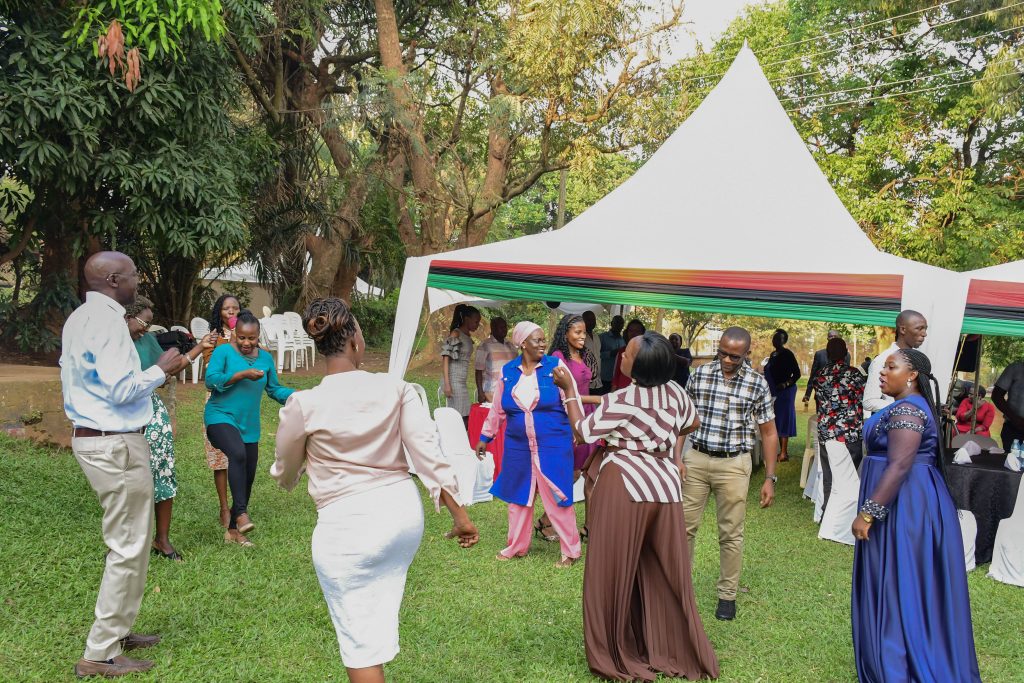
The following day (19th December 2025), the rejuvenated staff took to the College WhatsApp platform, and wrote messages, acknowledging being refreshed, feeling nice and young again. They requested the College leadership to plan for more of such engagements that promote teamwork, collegiality and good health.
Business & Management
Makerere University Launches CoBAMS Working Paper Series, Marking a major Leap in Research Excellence
Published
4 weeks agoon
December 8, 2025
On 4th December 2025, the Deputy Vice Chancellor for Academic Affairs, Prof. Sarah Ssali launched the College of Business and Management Sciences (CoBAMS) Working Paper Series, a research product aligned with the UN Sustainable Development Goals (SDGs), Uganda’s 10-fold National Economic Growth Strategy (ATMS), and the Makerere University Strategic Plan.
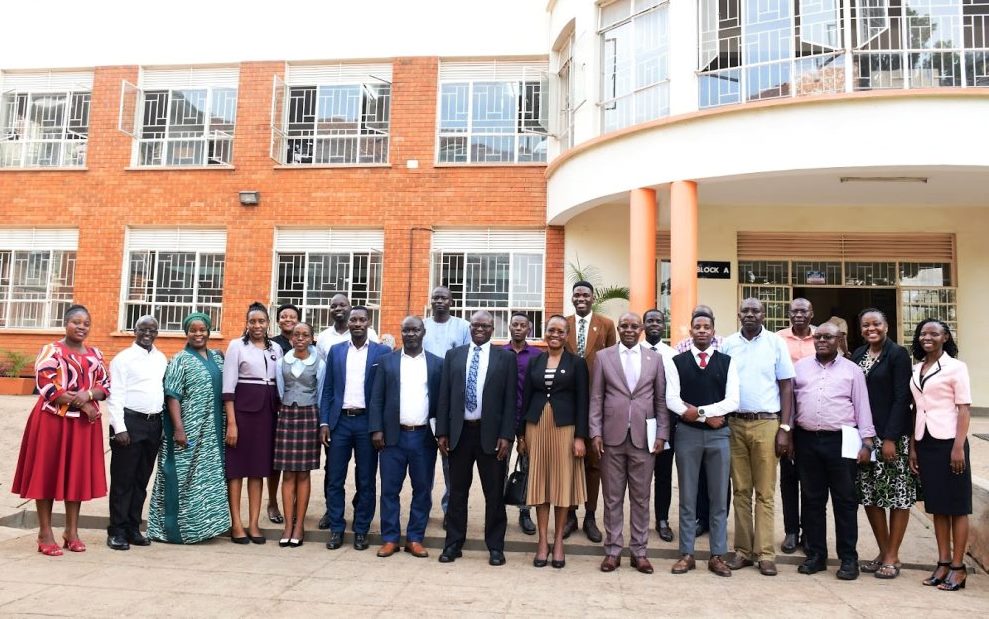
The Series consists of over 60 research papers, many of which have already been accepted in internationally recognised peer-reviewed journals. The publications cover a broad spectrum of national priorities, including unemployment, climate change, population dynamics, taxation, entrepreneurship, public investment, corruption, refugee livelihoods, and the green economy.
A landmark moment for Makerere University
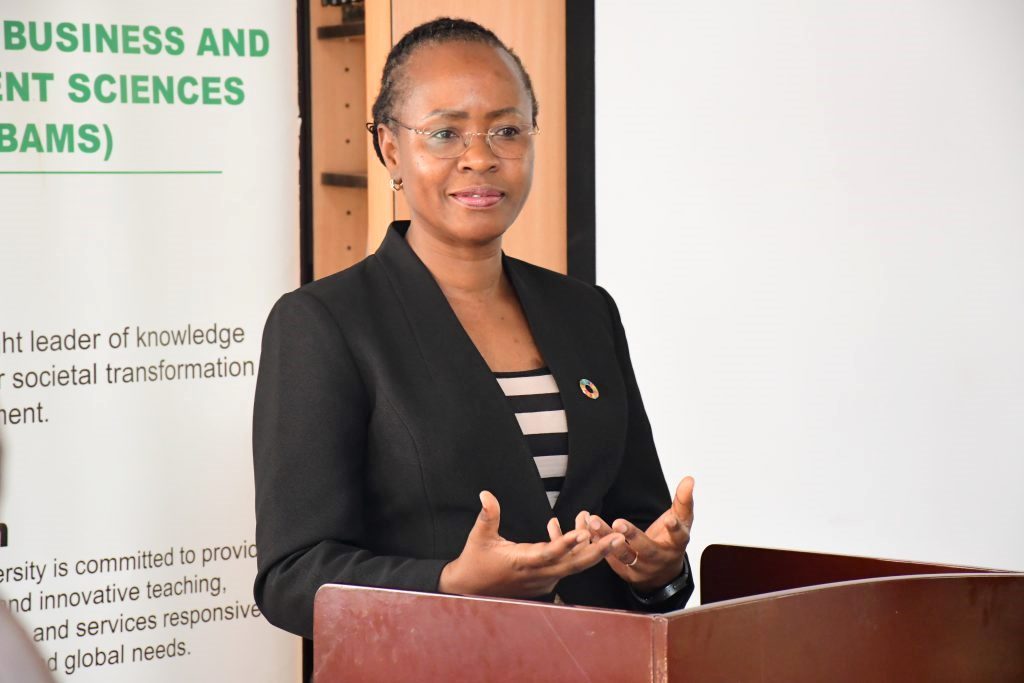
Addressing the participants comprising invited guests, staff, students and the media, who convened at the CoBAMS Conference Hall to witness the launch, Prof. Ssali commended the College leadership and staff for championing Makerere’s research vision. “Today is a landmark moment in the life of Makerere University,” she declared. She emphasized that Makerere’s move toward a research-intensive identity was deliberate. “A few years ago, we made a bold and historic decision to reorient the University toward research and innovation. Today’s launch is evidence that this decision has taken root—especially within CoBAMS.”
Prof. Ssali praised the College for providing a modest annual research grant to faculty members, an initiative that produced more than 60 working papers in the 2024/2025 financial year.
She urged the College to transition the Working Paper Series into homegrown journals, adding: “If you can produce 60 papers this year and 80 next year, you have enough content for at least three journals. Journals raise our visibility, raise our H-index, and ensure that anyone researching Uganda finds homegrown scholarship.”
The Deputy Vice Chancellor (Academic Affairs) highlighted pressing national issues requiring academic inquiry. “Uganda’s economy grows, but unemployment remains high. When we celebrate entrepreneurship, we are often celebrating survival. These are questions this Series must help confront.”
She also pointed to the importance of research in shaping national discourse: “If people are hungry and unemployed, they will go to the streets. We cannot sit here speaking English and pretend these issues will disappear.”
We are proud of this collective achievement
The Principal of CoBAMS, Prof. Edward Bbaale, described the Series as a major achievement rooted in collective effort and consistent commitment to research excellence. “What we are celebrating today is the result of your collective effort,” he told faculty. “This Working Paper Series is a nursery bed for journal articles, book chapters, and future scholarly outputs.”
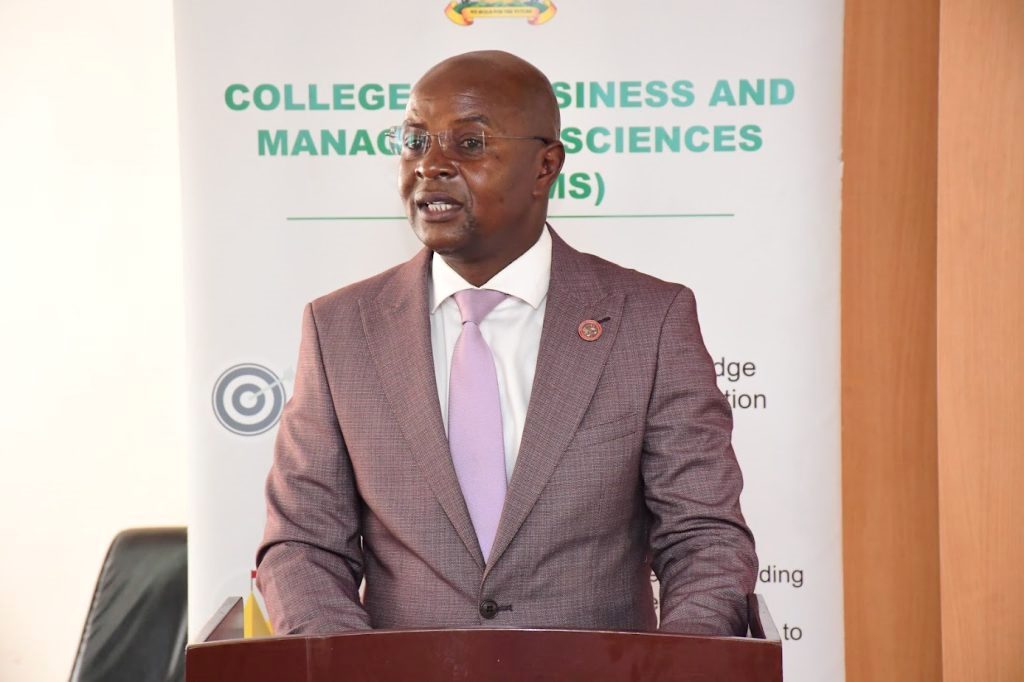
He revealed that for the upcoming(2026) paper series, the College has funded over 90 research concepts and expects to produce more than 80 working papers in the 2025/2026 cycle.
Prof. Bbaale emphasised that the College’s four research centres—in Entrepreneurship and Innovation, Statistics and Demography, Public Investment Management, and the Environment for Development Initiative—form a strong foundation for sustained knowledge production. “These centres anchor high-level research, policy engagement, and interdisciplinary collaboration. They are the backbone of our research ecosystem.”
This journey started with a modest grant
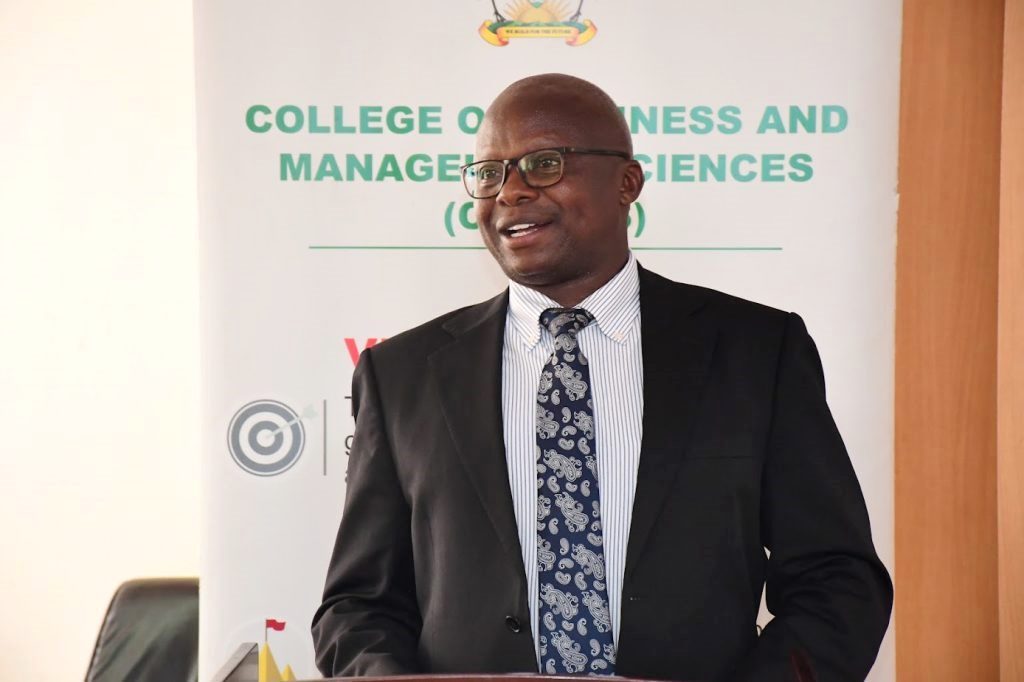
Associate Professor James Wokadala, the Deputy Principal, traced the origins of the Series to a small but impactful College research grant introduced in November 2024. “This afternoon is a very important day for us. This Series is the product of our internal efforts and internal resources,” he said. “By May this year, the working papers had already been finalised by the various principal investigators.”
He noted that each paper went through school-level presentations, editorial checks, and harmonisation before being accepted into the Series. “Today, we are launching 60 of those papers, with many more to follow.”
CoBAMS is a powerhouse of knowledge production

Dr. William Tayeebwa, Chief Managing Editor of Makerere University Press, praised the College’s output and pledged the Press’s support in transforming the papers into high-quality books and journal articles. “The topics and issues contained in the Working Paper Series confirm that CoBAMS is truly a powerhouse of knowledge production.”
He committed to working closely with the College: “We can convert these working papers into journal articles, special issues, and thematic book volumes within six months. Makerere University Press stands ready to support you.”
Dr. Tayeebwa highlighted the broad range of topics covered—refugees, Myooga, malaria, tax compliance, corruption, and more—describing the Series as “a rich intellectual nursery bed.”
PhD Forum: Building the next generation of researchers

Speaking on behalf of postgraduate students, Ms. Sylvia Namujjuzi, Assistant Lecturer and Vice President of the CoBAMS PhD Students Forum, emphasised the importance of peer support in research training. “The PhD journey can be lonely,” she said. “This Forum brings students from the three Schools together to network, share knowledge, organise seminars, and hold mock defences.”
A milestone for Makerere’s research future
Prof. Ssali reaffirmed the University’s commitment: “As Makerere University positions itself among leading research institutions globally, initiatives such as the CoBAMS Working Paper Series give concrete meaning to our strategic vision.”
She officially launched the Series with a call for sustained excellence: “May it grow, mature, and inspire a new generation of researchers. May it elevate Makerere University’s intellectual footprint.”
Trending
-
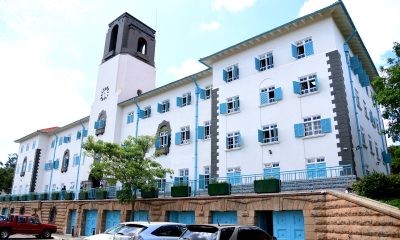
 General1 week ago
General1 week agoAdvert for the Position of the Second Deputy Vice Chancellor
-

 Law2 days ago
Law2 days agoDisclaimer Notice: LLB Pre-Entry Examination
-

 General1 week ago
General1 week agoUNDP and JNLC hold training in Fort Portal: Participants equipped with skills in Advocacy and Gender Equality, Team Building, Inclusive Leadership, and Financial Literacy
-

 General1 week ago
General1 week agoBreaking the Silence on Digital and Gender-Based Violence: Male Changemakers Lead Makerere University’s Strides for Change
-
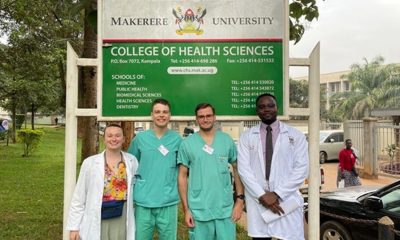
 Health1 week ago
Health1 week agoMakCHS Strengthens Internationalization through Strategic Global Partnerships and Mobility
